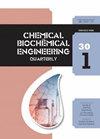印迹和水活度对离子液体中脂肪酶酯交换和热稳定性的影响
IF 0.9
4区 生物学
Q4 BIOTECHNOLOGY & APPLIED MICROBIOLOGY
引用次数: 0
摘要
采用离子液体[Cnmim][PF6] (n=4,6,8)和苯为底物,研究了生物印迹和水活性对酯交换酶催化活性和热稳定性的影响。在苯和[C4mim][PF6]中印迹可提高催化活性,两种溶剂中酯交换活性与水活度呈近似钟形关系。在苯中的酯交换反应活性高于在[C4mim][PF6]中的反应活性。考察了水活度和印迹对[C4mim][PF6]中动力学参数的影响。在不控制含水量的情况下,压印可降低乙酸乙烯酯和苯甲醇的米切里斯常数Km、VA和Km、BA,提高最大速率Vm。另一方面,通过控制有机介质中的含水量,Vm、Km、VA和Km、BA的值通过压印而增加。脂肪酶在离子液体中的活性受水活度和印迹的影响比在苯中的活性更大。我们观察到水活度对热稳定性的影响,但印迹没有影响。本文章由计算机程序翻译,如有差异,请以英文原文为准。
Effects of Imprinting and Water Activity on Transesterification and Thermostability with Lipases in Ionic Liquid
The effect of bio-imprinting and water activity on catalytic activities and the thermostability of lipases was investigated for transesterification using vinyl acetate and benzyl alcohol as substrates in ionic liquid, [Cnmim][PF6] (n=4,6,8), and benzene. The catalytic activities were enhanced by imprinting in benzene and [C4mim][PF6], and the relations between the transesterification activities and the water activity in both solvents were approximately bell shaped. The reactivity of the transesterification in benzene was higher than that in [C4mim][PF6]. The effects of water activity and imprinting on the kinetic parameters in [C4mim][PF6] were examined. Without controlling the water content, the values of Km,VA and Km,BA (Michaelis constants of vinyl acetate and benzyl alcohol, respectively) decreased, and the values of Vm (maximum rate) increased by imprinting. On the other hand, by controlling the water content in the organic media, the values of Vm, Km,VA, and Km,BA increased by imprinting. The activities of lipase in ionic liquid are more strongly affected by water activity and imprinting than those in benzene. We observed effects of water activity on thermostability but none from imprinting.
求助全文
通过发布文献求助,成功后即可免费获取论文全文。
去求助
来源期刊
CiteScore
2.70
自引率
6.70%
发文量
23
审稿时长
>12 weeks
期刊介绍:
The journal provides an international forum for presentation of original papers, reviews and discussions on the latest developments in chemical and biochemical engineering. The scope of the journal is wide and no limitation except relevance to chemical and biochemical engineering is required.
The criteria for the acceptance of papers are originality, quality of work and clarity of style. All papers are subject to reviewing by at least two international experts (blind peer review).
The language of the journal is English. Final versions of the manuscripts are subject to metric (SI units and IUPAC recommendations) and English language reviewing.
Editor and Editorial board make the final decision about acceptance of a manuscript.
Page charges are excluded.

 求助内容:
求助内容: 应助结果提醒方式:
应助结果提醒方式:


